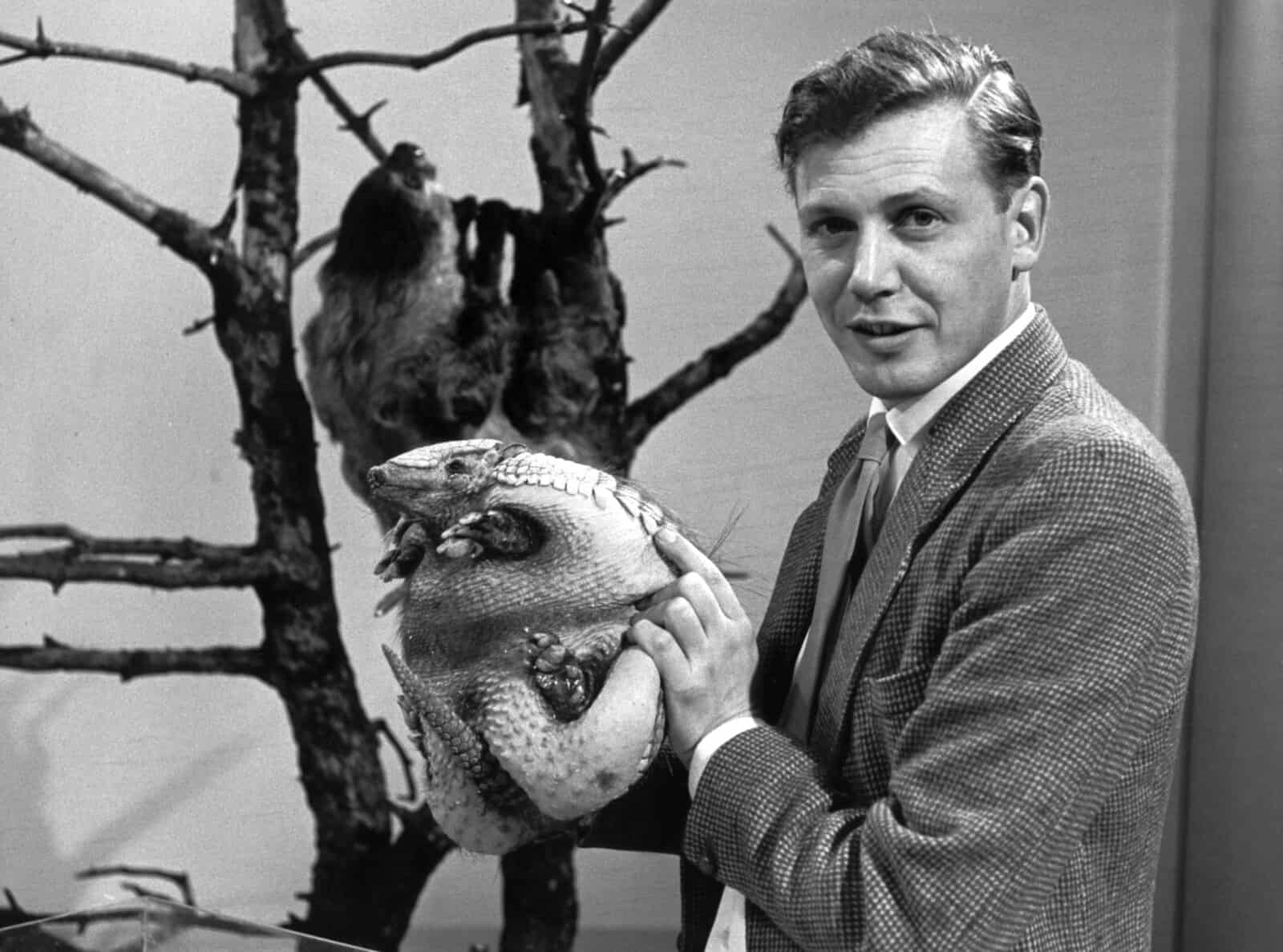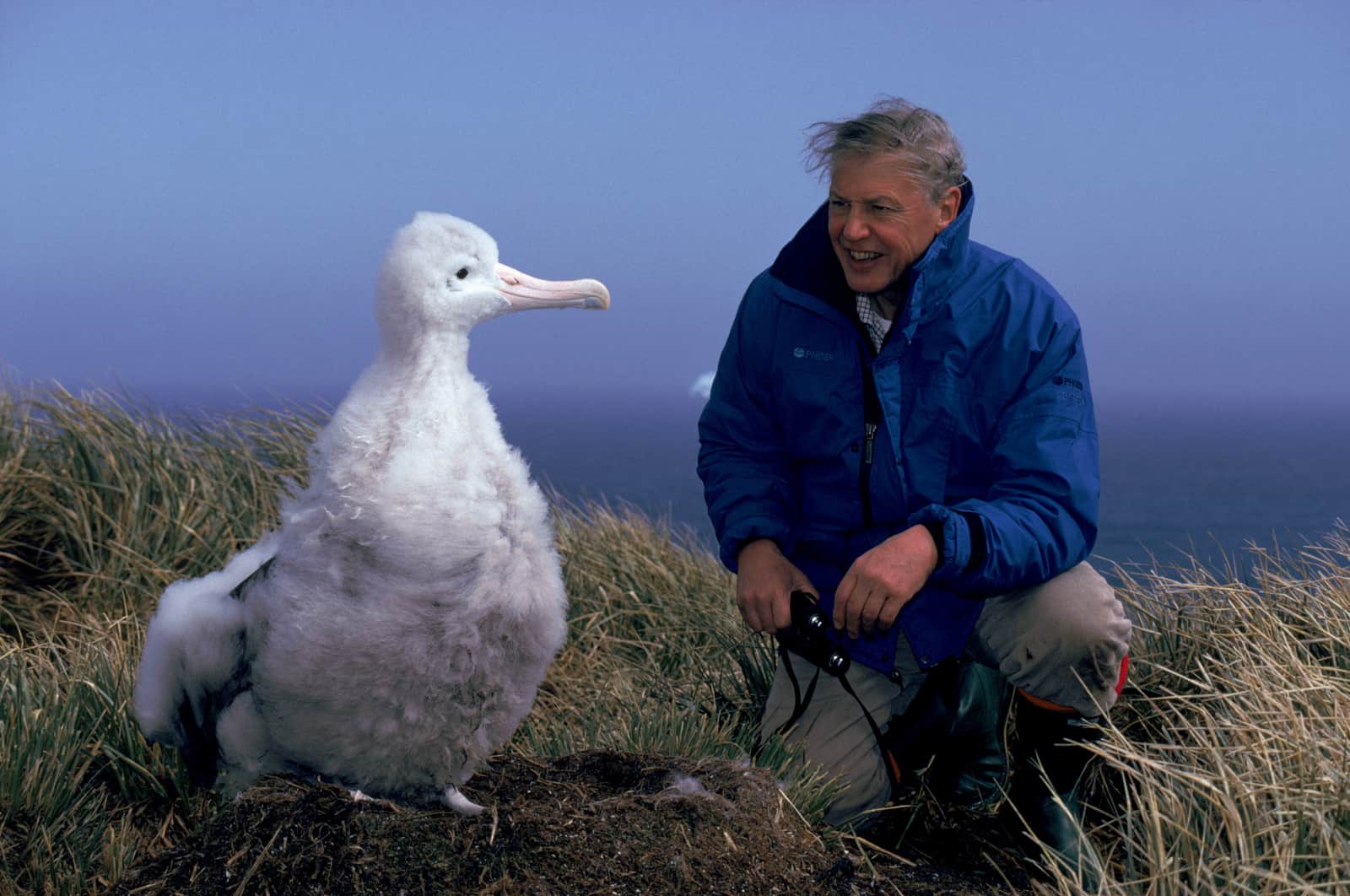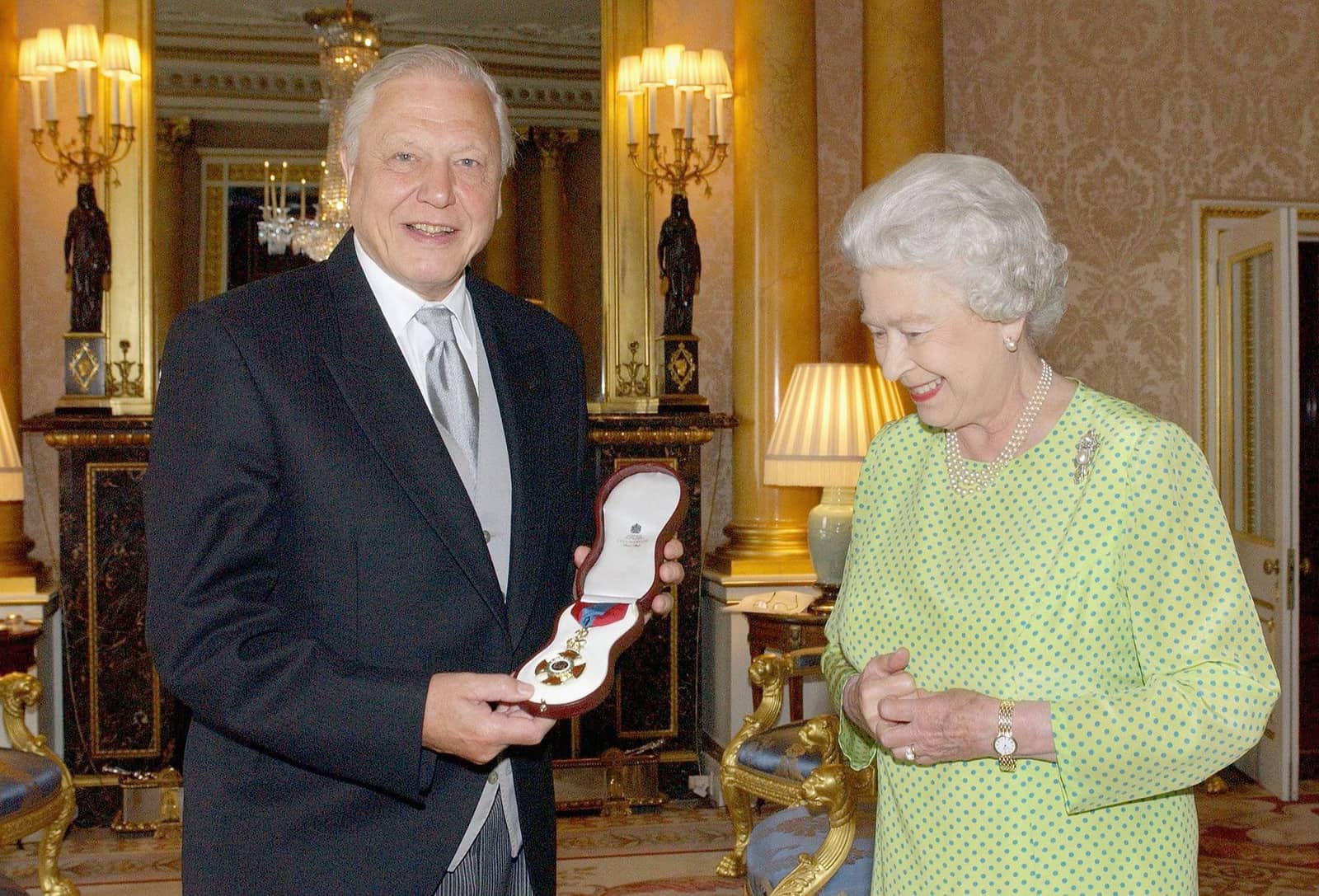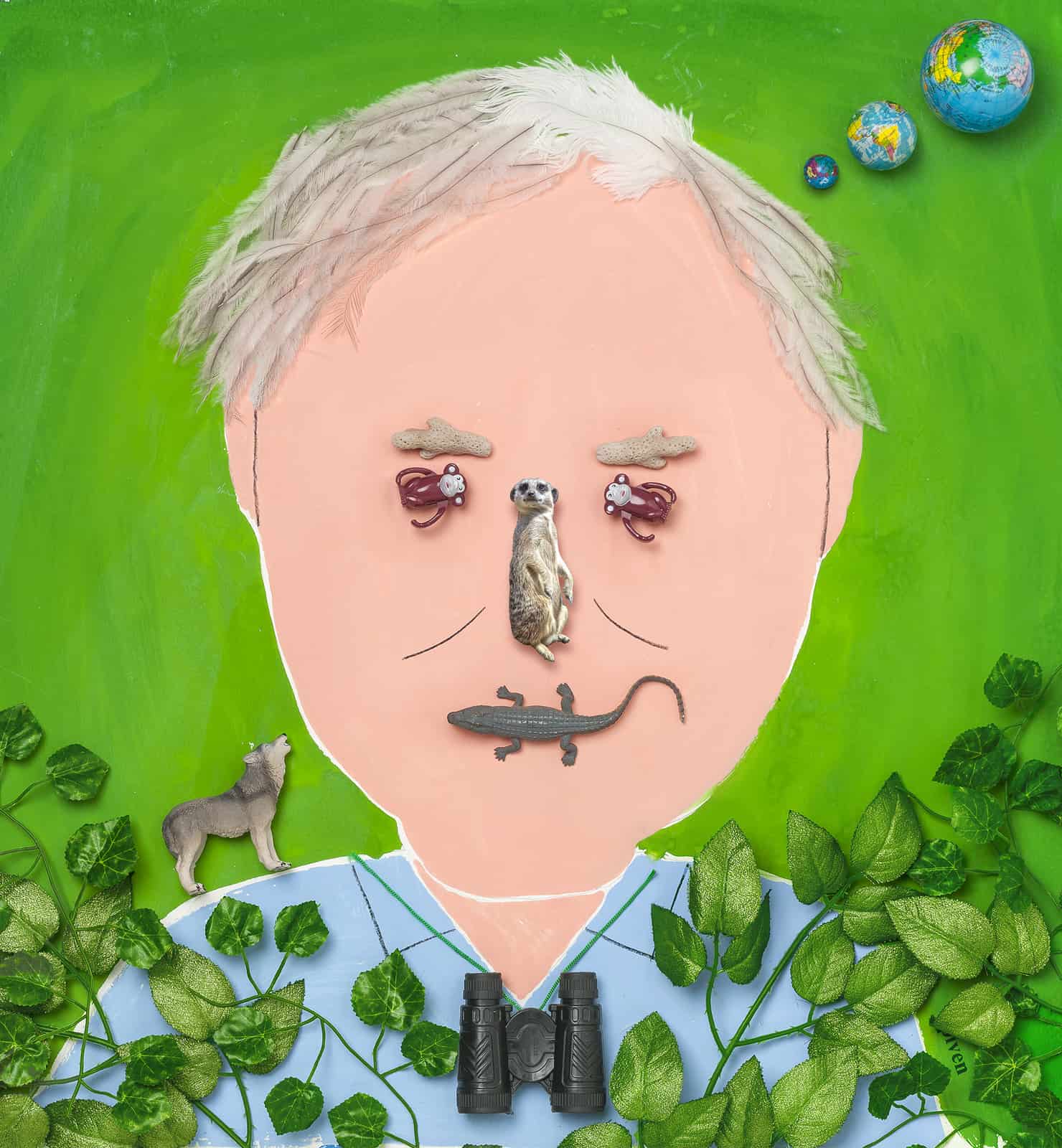ILLUSTRATION BY HANOCH PIVEN
There are a few people whose very names evoke everything that is right and just about an environmental cause: Jane Goodall and the protection of the apes; Jacques Cousteau and the welfare of the oceans; and Sir David Attenborough and the preservation of, well, the entire planet.
Since 1954, Attenborough has been a fixture on the BBC—as a producer, director, writer, and presenter—bringing television viewers to strange and exotic locales in an effort to educate and inspire us about the wonders of the natural world. We’ve tagged along while he swam with angelfish at the Great Barrier Reef, cuddled with gorillas in the Virunga Mountains of Rwanda, and howled with wolves in North America. It’s a life that earned him a British knighthood all the way back in 1985, but 34 years later, Attenborough continues to find new platforms. This month, as he approaches his 93rd birthday, he serves as narrator for the landmark Netflix documentary, Our Planet, an eight-part series that takes viewers to some of the world’s most precious and endangered natural habitats.
We rang Attenborough to talk about his experience of seeing great changes in both television and the environment—one for the better, the other for the worse—over the better part of the last seven decades. For good measure, we asked if he was still able to perform his patented wolf call.
I’m not accustomed to interviewing people with honorifics bestowed upon them by the British monarchy. How do I address you? Is it Sir David, Sir Attenborough, Sir David Attenborough, Sir Mr. David Attenborough?
You can call me whatever you wish! But David will do.
OK, David. Now you’re one of those public figures who requires no introduction, but then it’s a bit difficult to pin you down, exactly: television pioneer, explorer, natural historian…
Well, now I definitely do feel pinned down!
Then let’s put it another way. Let’s say we were transported to some alternate universe in which you were a complete unknown, and someone asked you what your job was. How would you reply?
I’d say, “I make television programs about the natural world.”

Which you’ve been doing since the 1950s, before climate change was a topic of conversation.
It wasn’t a topic of conversation because it wasn’t happening.
It was not happening or we didn’t know that it was happening?
Well, it wasn’t happening at the speeds at which it is happening now.
Was there a specific moment when it dawned on you that the world was in trouble, and you shifted from simply documenting the natural world to showing how the natural world was at risk?
I don’t think there was one particular moment. It slowly dawned on you. I started off by trying to show what happens in the natural world: the various processes that exist, the way animal communities work, the way different kinds of individual species of animals have come into existence. But in the 1970s, you began to realize that there were other kinds of stories, and that was what humans were doing to the natural world. You may start off aiming to show life in the jungle, but then you suddenly realize, “Hang on, there are other things happening apart from the way in which animals live in the jungle. We are having less jungle!” Then you change.
You’d better find more fundamental solutions to the problem than just putting in air conditioners
Narrative is an essential part of your work. It’s not just a camera trained on animals going about their day-to-day life; there’s the drama of the hunt, the tenderness of a mother caring for her children, the comedy of two male rivals competing for the affections of the same female. We see all of this happening on film, but the narration you provide amplifies these stories. Does the process of writing for nature documentaries have much in common with the process of writing for a Hollywood film?
It’s not creative writing in that sense. I think probably the best narration is minimal narration. My ambition is only to write those words necessary to make the images understandable. I don’t try to write flowery narrations to say how clever I am or how poetic I am or how lit- erary I am. The words that I provide are the words that you need before you are to understand what is happening in the vision in front of you.
People rarely appear in your work. Is that intentional? Do you think viewers are more inclined to care about climate change when they see the impact on the animal world, as opposed to the impact on human society?
Well, the animal world is where the main results are felt, because human beings are so inventive and so clever. If we don’t like a climatic situation, we retreat or we find all sorts of ways in which we can actually refrigerate the atmosphere in which we live. But that only takes you so far. In the end, you’re going to run out of energy, so you’d better find more fundamental solutions to the problem than just putting in air conditioners.
I was surprised to learn that your 2017 BBC documentary, Blue Planet II, was the most watched television program in the U.K. that year. How do you explain that popularity?
I don’t find it surprising. I think if you’ve got a subject that is beautiful, unexpected, novel, full of astonishment, that shows you things you’ve never seen before and understandings you’ve never had before and isn’t trying to get your vote or to change your buying habits, what more do you want from a program on television?

Your forthcoming documentary, Our Planet, is set to air on Netflix. As someone who’s been on television since the dawn of the medium, what’s your take on streaming platforms?
Well, I think the first programs I made in the 1950s were only seeable by people who lived in southern England. Suddenly, with Netflix, you can put out a whole eight-hour series and make it available immediately to over 200 million people—just instantaneously! And, what is more, to keep it there for six months, so that they can look at any part of it whenever they wish. That is a total transformation of the nature of television. You had better take notice of that. You’d better take advantage of that if you think that what you’re doing is worth watching and has some sort of importance.
With that kind of platform, do you think Our Planet has the potential to spur global action on climate change?
I sincerely hope so. As soon as people begin to realize that the planet is in danger, they have a moral responsibil- ity to do something about it. You can’t just sit by and keep your mouth shut and ignore the fact that, unless we take action, we’re going to lose all these wonderful things that I’ve been filming for the last 65 years.
As a public figure, you’re one of our greatest advocates for the environment. On a personal level, how much of an effort do you make to minimize your carbon footprint?
I can’t pretend to be a particular saint in these things. I try and save energy when I can. I don’t light fires when I don’t need them. I don’t eat much red meat, partly because I just don’t care for it. When you get to my age you don’t have huge meals anyway. I don’t use plastic straws. Never have. I can’t see why you have to drink up from straws—God gave me lips!
Click edit button to change this text. Lorem ipsum dolor sit amet consectetur adipiscing elit dolor. Click edit button to change this text. Lorem ipsum dolor sit amet consectetur adipiscing elit dolor
Over the course of your career, you’ve traveled the world many times over. Is there a place that you haven’t been that you would like to visit?
I would like to go to the middle of the Gobi Desert just to look for fossils, but there aren’t any animals there, so I don’t suppose anybody will ever send me.
Of all the places that you have been in the world, where has the impact of climate change been most astonishing to you?
The Great Barrier Reef. There are individual reefs that I’ve swum on years gone by which were full of a myriad of fish and crustaceans and all kinds of life which suddenly no longer exist. They’ve been destroyed, and that’s devastating. That’s a huge, complex community of dozens of different kinds of species which have simply gone and vanished.
Beyond showing an audience the destruction of the Great Barrier Reef and the beauty that’s been lost, how can you persuade more people to take climate change seriously?
Show them scientific evidence.
Unfortunately, there are many people who will just call that evidence a hoax.
And there’s quite a lot of people who still believe that the world is flat. And you can produce all the evidence you like, including flying around it, and they’ll find reasons for explaining why it isn’t the case. There’s a kind of conviction which isn’t susceptible to rational argument. There’s nothing you can do about that, unfortunately.

Do you think your style of documentary filmmaking can cut through that?
I think that the responsibility of documentary filmmakers is to show what the evidence is and hope that people will be able to think about it enough and draw some of their own conclusions.
Well, I’m sure that your work has resulted in some converts. When you stop making documentaries, who will fill your formidable shoes?
Oh, bags of people. I’m sure there are plenty of natural history filmmakers and commentary writers who are say- ing, “Why doesn’t he stop and give me a go?” There are plenty who are waiting for the opportunity to do the sort of pro- grams I do. And they’ll get their chance before long.
If you don’t mind, I have one final question. In my research for this interview, I came upon a clip of you performing an impressive wolf call across an expanse of prairie. A pack of wolves some distance away responds in kind to your call. As you approach 93 years of age, are you still able to perform that call and, if so, can you give us a little sample?
I don’t think the airwaves would carry it properly.
But are you capable of it?
I would suppose so, but I haven’t done it for a long time. But I don’t think we need to waste a ton of phone call in me trying to convince you I can still do it.
But you are confident that you can?
Of course. I’m fairly confident I can continue speaking, as well.
Well we’re happy to hear that.
There it is!
No. That was just a wolf that happened to be sitting beside me. I don’t go anywhere without him.
BY THE NUMBERS
1952
Year Attenborough joined the BBC (he didn’t own a TV at the time)
32
Honorary degrees he has received from U.K. universities—more than anyone else
24
Species and genera named after him, including a millimeter-long goblin spider, an extinct marsupial lion, and a carnivorous plant big enough to eat shrews
17
Days younger he is than Queen Elizabeth II
256,000
Miles he traveled for his The Life of Birds documentary (equivalent to circumnavigating the globe 10 times)
1969
Year he gave the greenlight to Monty Python’s Flying Circus as the controller of BBC Two
83
His age when he reached the North Pole for the first time




